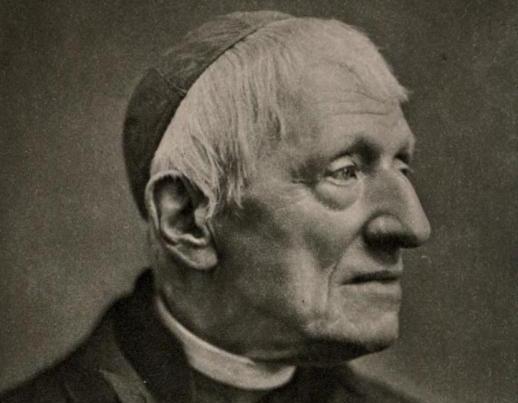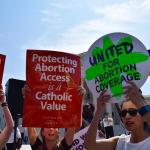John Henry Newman believed that “a civilised age” might put a nice, unthreatening religion in place of the Gospel. “Benevolence” would become “the chief virtue; intolerance, bigotry, the first of sins.” The “dark side of religion”, the risk of eternal punishment, the awfulness of disobeying God, would be airbrushed from the picture. . . .
In 2000, Cardinal Joseph Ratzinger suggested that any future persecution would be directed not against Christianity in general, but against a subset of Christians defined as “fundamentalist” or extreme. The future pope noted that the authorities would never “openly persecute Christians; that would be too old-fashioned and unsuitable. No, they are most tolerant; they are of course open to everything. But then there are all the more definite things that are excluded and which are then declared to be fundamentalist.”
Newman (1801-1890) was a leader of the high-church movement in the Anglican church, who later went all the way to become a convert to Catholicism and, eventually, a cardinal.
Cardinal Ratzinger became Pope Benedict XVI, who stepped down from the papacy and is now considered “pope emeritus.”
His prediction is essentially that liberal Christians would be tolerated, while conservative Christians would be persecuted. I think he is basically right, but it seems that liberal Christians are so assimilated into the non-Christian world that they are barely visible. I don’t recall any critics of Christianity making an exception for liberal Christianity, even though they would probably be in basic agreement on most points. Liberal Christianity continues to be very influential within church bodies and within the theology departments of universities and seminaries. But liberal Christians hardly register with outsiders. That’s quite a contrast with the first two-thirds of the 20th century, when “mainline Protestants” were the acknowledged and accepted representatives of Christianity in the culture. Now we should probably get a new term: the liberal denominations are hardly “mainline” anymore.
Cardinal Ratzinger was right, though, that the ruling secularists just hate “fundamentalism,” by which they mean any religious person who believes what their religion teaches. “Fundamentalists” are no longer the conservative Protestants who signed the “Fundamentals” of the faith, against the encroachment of religious liberalism. There are “fundamentalist” Catholics, “fundamentalist” Mormons, “fundamentalist” Muslims, and, I suppose, “fundamentalist” Calvinists and “fundamentalist” Lutherans. The content of the beliefs, the actual religion or theology, make no difference. What makes a fundamentalist is holding those beliefs, whatever they are, to be “fundamental.”
Cardinal Newman’s prediction is exactly on target. His prediction is older, which makes a prediction for far in the future more impressive when it comes true. For him, the apotheosis of “Benevolence” is not some watered down version of Christianity but a new religion altogether.
“Benevolence” has indeed become “the chief virtue; intolerance, bigotry, the first of sins.” The “dark” dimension of religion–judgment and eternal punishment, to be sure, but also suffering, atonement, blood sacrifice, and the Cross–are not sunshiny enough.
And yet, ours is a very “dark” time, full of cynicism and depression, embracing death, fascinated with the occult, and cultivating despair. The “dark” parts of Christianity, ironically, can meet the darkness of sin, overcoming it with the light of God’s grace, the true benevolence.
Photo of John Henry Newman by Herbert Rose Barraud [Public domain], via Wikimedia Commons














